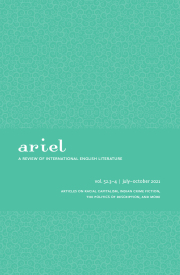"A Different Economy": Postcolonial Clearings in David Chariandy's Brother
Keywords:
David Chariandy, Brother, economy, value, clearings, Black, barbershop, crime, musicAbstract
This article explores the tyranny of race and space as well as intrinsic rather than instrumental value in David Chariandy’s Brother (2017). Borrowing from the theories of critical race scholars including Rinaldo Walcott, Idil Abdillahi and Frantz Fanon, the paper argues for an economy privileging the value of human bonds over money. A response to dominant Canadian discourses which position Black men as criminals, Chariandy’s novel places a positive value on Black masculinities and communities haunted by law enforcement in their homes and small businesses. Deemed both “known to police” and a “problem,” the characters in Brother find refuge in what I call postcolonial clearings, which take the form of barbershops, hidden valleys, music and other characters. The article begins with the premise that Canada is colonized territory for Black people treated as second-class citizens. In the context of the Black Lives Matter movement, the paper underscores the deaths of two Black men in the Toronto of the mid-1990s. Chariandy not only breathes life into Black men rendered nameless and faceless by powers-that-be, he also questions the central ideals and pillars of the Canadian nation-state.


